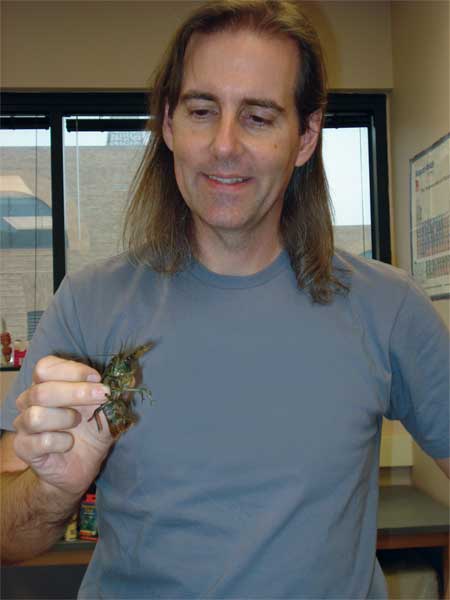He's got a cool name, a quirky video, is plugged into social media and is looking for your support. It might not sound like a pitch for a scientific study but
Dr. Zen Faulkes (BSc '89) is like any other researcher – he's just found a new way to grab your attention.
Faulkes, an associate professor of biology at The University of Texas-Pan American, has just concluded his second SciFund Challenge fundraising project through the crowd-funding site rockethub.com. On each occasion, Faulkes earned enough donated cash to fund his projects, which involve the behavioural characteristics of crayfish and sand crabs.
"It's a concept that every charity has been using for years," says Faulkes, whose interest in aquatic species was cultivated at the U of L by Dr. Jennifer Mather (psychology). "It's pretty simple, get everybody to kick in a small amount of cash and then pool the money for a common aid."
It's a model that has been adopted with great success by artists, and one that science is just beginning to test.
"It is an ideological change in that there has been some resistance to self promotion to people outside of your professional community," says Faulkes of the public pitch concept. "It's not a change in that pretty much every scientist is going to tell you the importance of self promotion, networking and getting your work out there. The only difference is a slight shift in target."

Faulkes uses an Indiana Jones-themed video in one of his pitches (Doctor Zen and the Amazon Crayfish Civilization) and admits it is offbeat.
"It's goofy, quite intentionally so, but that's just me and I'm not pretending that my approach is going to be the right approach for everyone," he says, adding that people don't necessarily have to understand your science to fund it, rather they might just follow it because it's cool.
"That's something I think we have undervalued in the past. People will support stuff just because they think it's cool," he says. "I think that has been highly underestimated, the willingness of people to support things just because."
Originally from Lethbridge, Faulkes moved around a lot as a kid before eventually returning to take his undergraduate studies at the U of L. He credits Mather for setting him on his career path, when he simply expressed an interest in the pending arrival of some octopuses for one of her studies.
"I was just talking to her about class and she mentioned she was getting some octopuses in and I made the mistake of saying, "That sounds interesting", and suddenly the door closed behind me and before I knew what was going on, she had recruited me," he laughs.
She later nominated Faulkes for a Natural Sciences and Engineering Research Council (NSERC) grant and he was on his way. That opportunity to participate in research as an undergraduate student would shape his studies years later.
"I'm in a university that has, in some ways, a similar kind of mindset to the
U of L," says Faulkes. "It has graduate studies but is still mostly an undergraduate institution, and people wondered how I could conduct studies without doctoral students at my disposal. I told them I came from a place where you can work with undergraduate students and have a research career and you can do research that's the equal of any place in the world. That's one of the things I learned from the University of Lethbridge."
Faulkes will head to Florida in November to conduct his research funded by the SciFund Challenge. His website at doctorzen.net details his studies, while his SciFund projects can be viewed at www.rockethub.com.
This story first appeared in the June 2012 issue of the Legend. For a look at the entire issue in flipbook format, follow this link.
